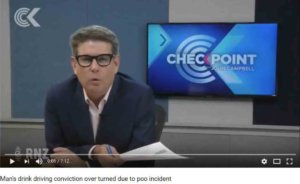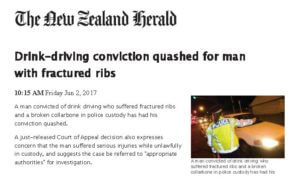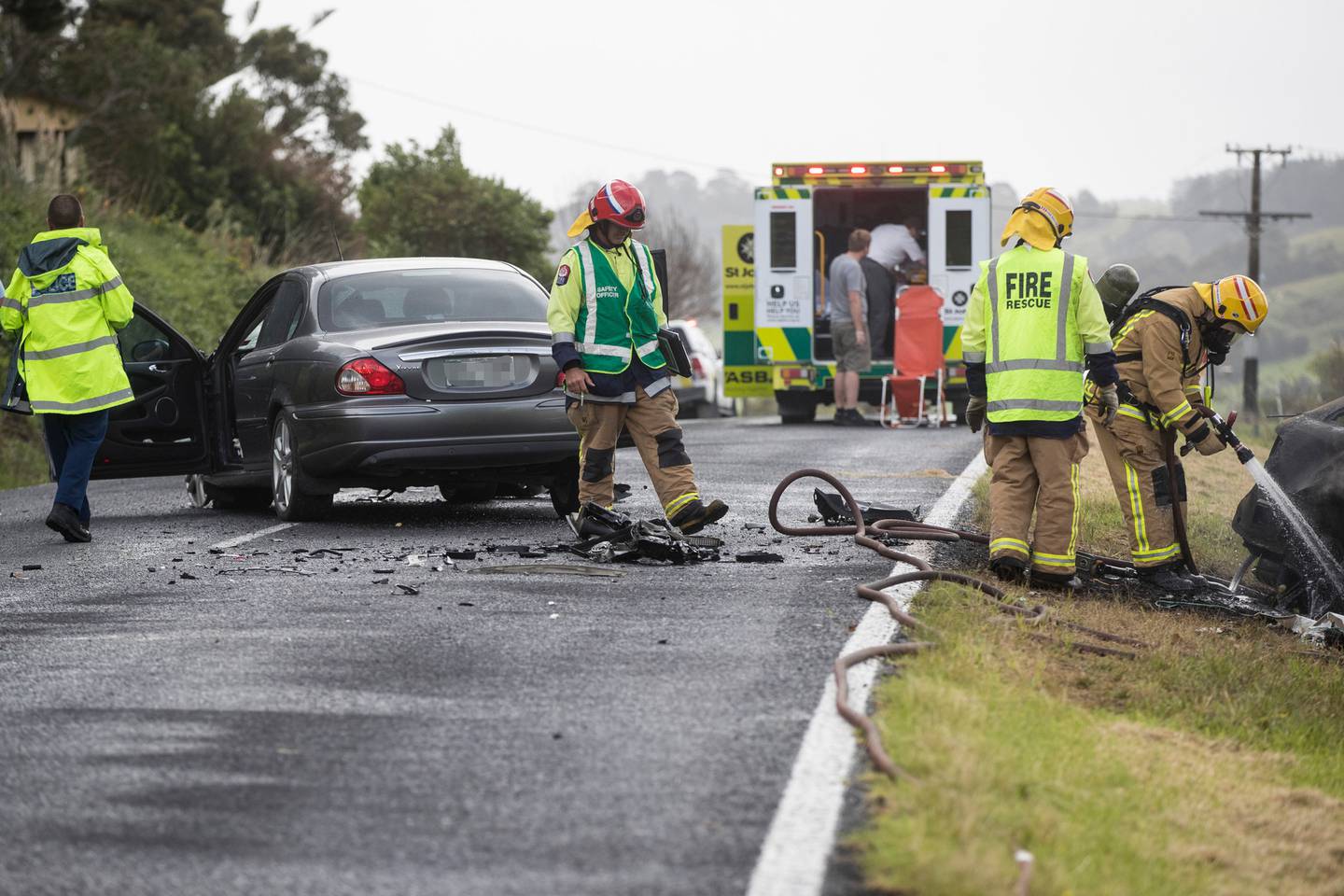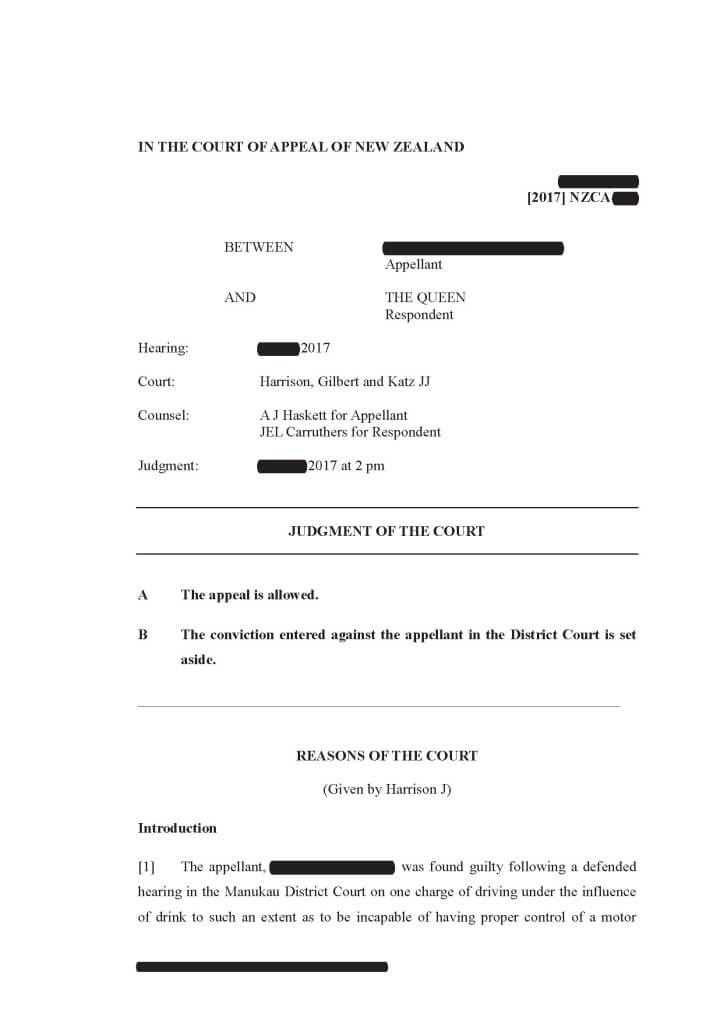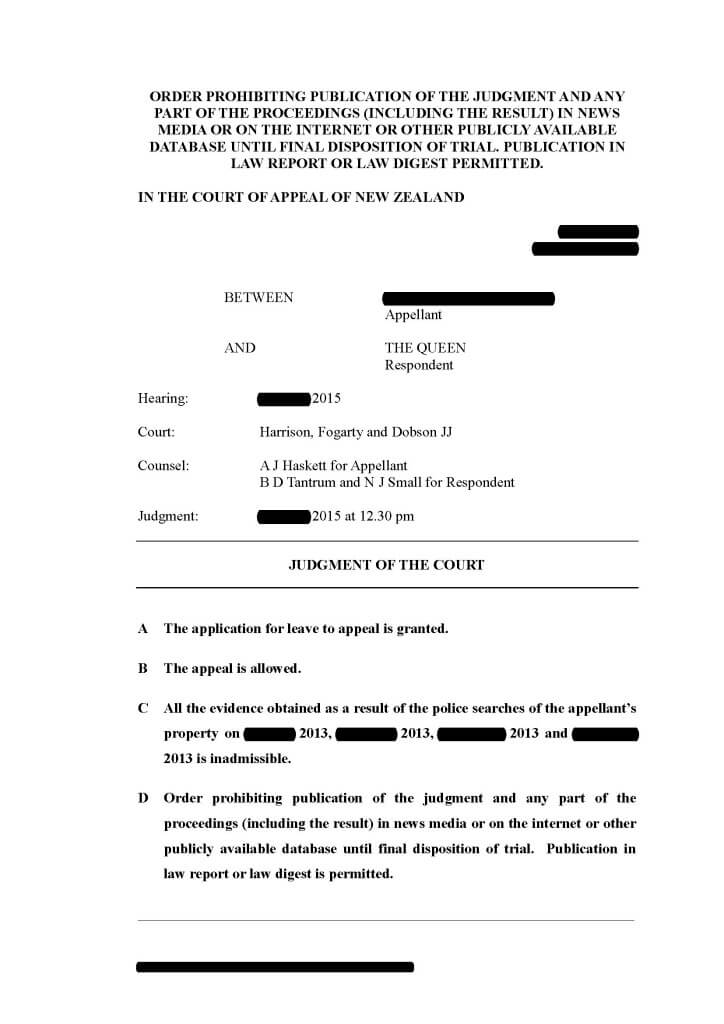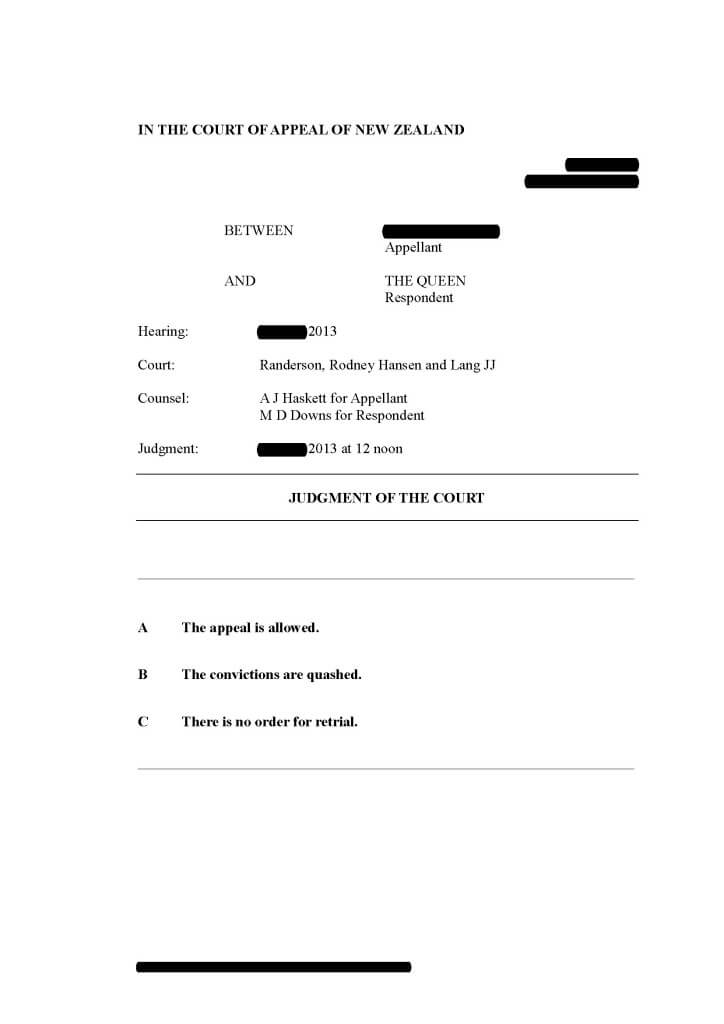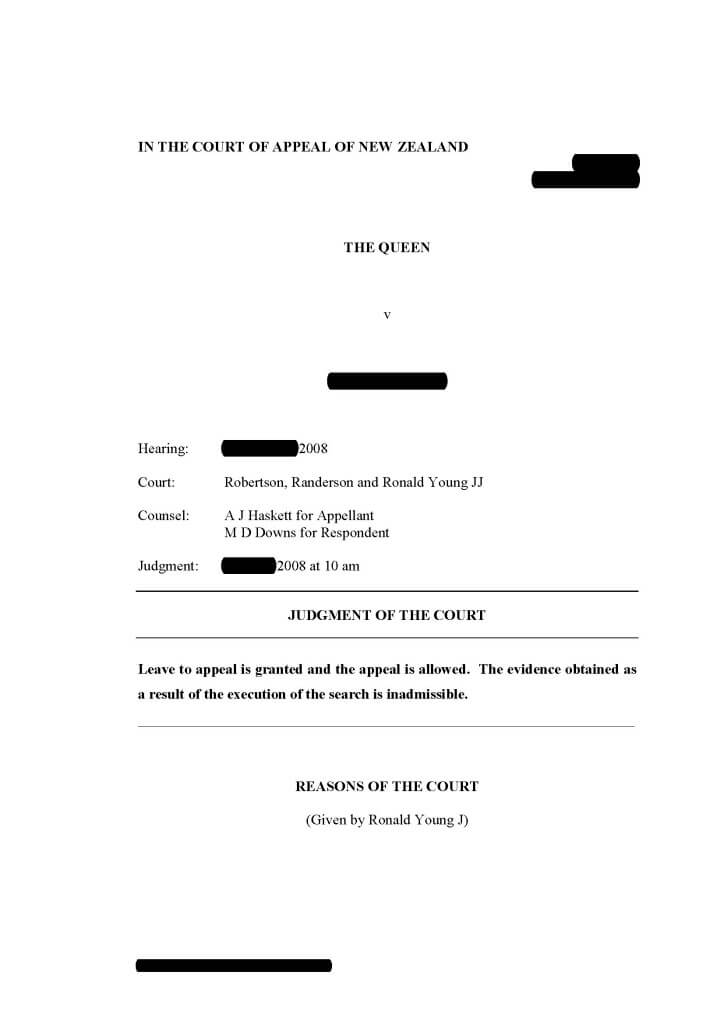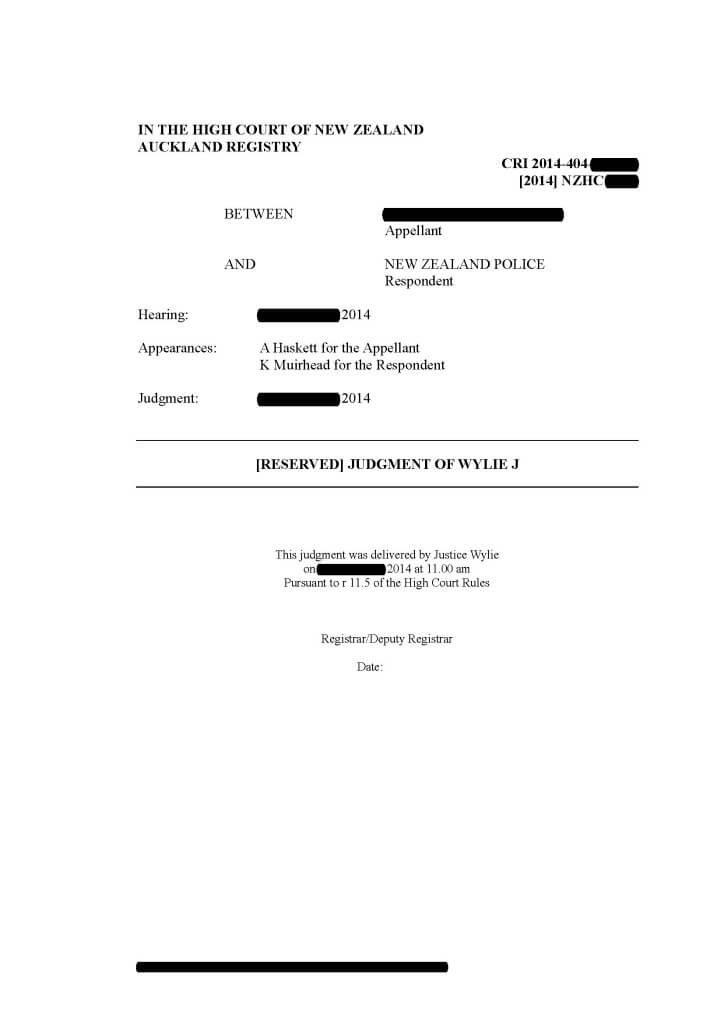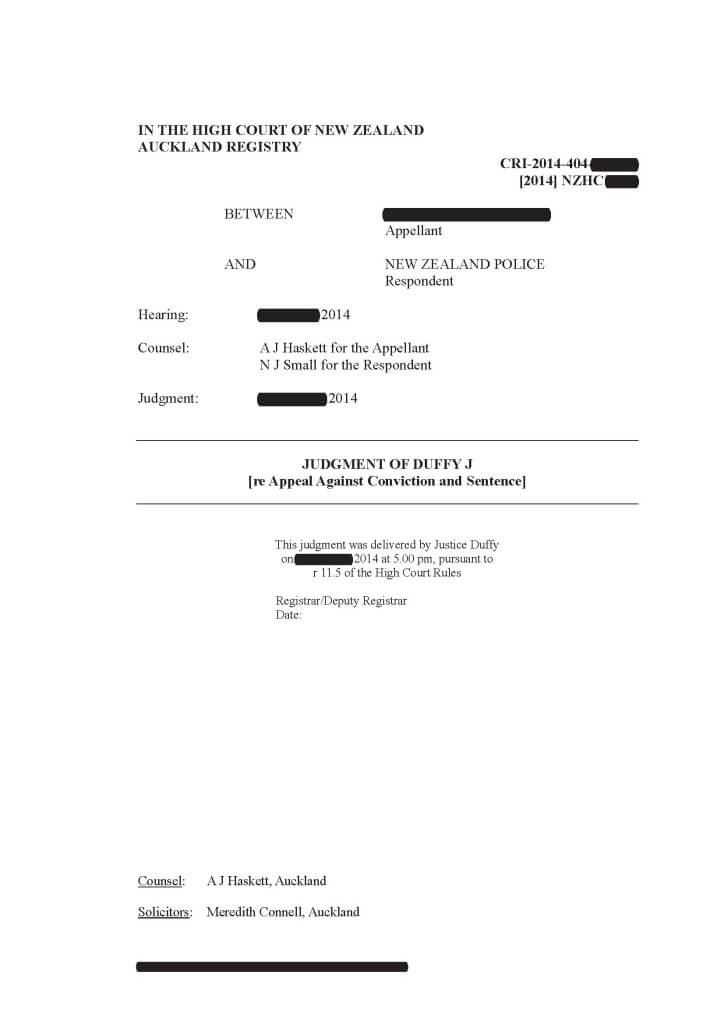Driving Convictions and Disqualifications Avoided
Call 0800 ROAD LEGAL if you want to avoid conviction and disqualification on traffic offences.
Here are more than 100 examples of Alistair’s successful results:
- Helicopter chase comes up short. The Police helicopter tracked a car said to have been running from police on the ground. Infrared CCTV footage from the helicopter showed the pursuit and subsequent arrest by armed police on the ground. Our client was charged with failing to stop and driving with excess breath alcohol. We successfully defended the allegations, questioning the lawfulness of the police helicopter and assault by police on the driver.
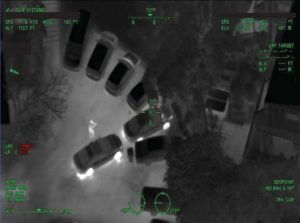
- Another defence lawyer referred her daughter to us to defend. The client was found not guilty after we exposed the police officer's unreasonable conduct of refusing to accept the client's request for a blood test seconds after the 10 minute election period had ended.
- This young serviceman was at risk of losing his job if convicted on his 9th alcohol related offence. He turned down a sentence indication of community detention, community work, disqualification, an alcohol interlock order and a zero alcohol licence order. The case was dismissed at a defended hearing, without the client needing to give evidence. After we cross-examined the police officer the Judge found the officer had a “lack of openness” and had “kept from me” important information about the testing procedure.
- A client was prevented from using his own mobile phone to try calling his brother and to try getting a lawyer of his choice. The police officer took the phone unlawfully, which the Court of Appeal in 2019 described as "simply wrong" when quashing the conviction. Bully and pressure tactics are just some of the improper tricks that police use. Time to update misleading police posters saying phones can be taken for privacy reasons and that police do not have to get your preferred lawyer.
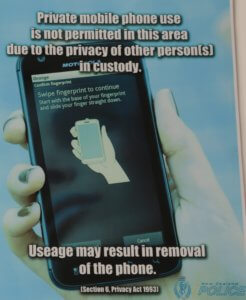
- This client was at risk of deportation if convicted. Case successfully defended on the grounds of a total absence of fault, the judge concluding that the defence had proved that the client's drinks had been spiked.
- A businessman was found not guilty after a defended hearing in the Auckland District Court because of a defect in the certificate for the evidential breath test machine.
- An insurance worker was found not guilty because the officer had not seen her driving the car. The client had been seen weaving all over the road by an independent witness, who then took over driving the car at a set of traffic lights and parked it at some shops. When the police officer arrived he saw the man who had intervened in the driver's seat, but the officer failed to make a link in his evidence between the client and the car.
- This international student had been found asleep behind the wheel of his car in central Auckland, on the wrong side of the road and crashed into a parked car. The charge was dismissed or stayed as a result of police failing to disclose information
- This courier driver was acquitted on a 4th drink-driving charge involving a crash because police could not disprove that the true driver had left the scene before police arrived.
- A hospitality worker was acquitted after driving with a breath alcohol level of 969 micrograms and knocking down a power pole, because the officer had given her a suspension notice during the 10 minute period.
- This top scientist was found not guilty of driving with excess breath alcohol because there was a commotion on the booze bus which distracted him during the 10 minute blood election period.
- This businessman's case was dismissed In the North Shore District Court because he was unlawfully detained in his driveway by police. The Judge concluded that the driveway was not a road and there had been no right to detain the client.
- Not guilty because the officer failed to advise the client without delay about the result of the evidential breath test and the right to elect a blood test.
- This mother's case was withdrawn in the Ohakune District Court after we negotiated the police withdrawal of the excess breath alcohol charge on the basis of the officer failing to take the client to a place where a blood test could be done.
- A medical student with a cloud over his future career if convicted had his case withdrawn in the Waihi District Court after we discovered fatal flaws in the officer's paperwork relating to the 10 minute period.
- A model worried about the impact a conviction would have on her future had her case dismissed because the police had not instigated the charge within the required time limit.
- Prosecution permanently stayed because the police had not disclosed material information.
- This young client came to us after having already entered a guilty plea after speaking to a duty lawyer. We had the guilty plea vacated and the case dismissed in the Manukau District Court because the police had not conducted a roadside breath screening test, which we proved by obtaining a copy of police radio communications.
- Not guilty after police had manhandled the client.
- A truck driver had his case dismissed in the Dunedin District Court after we argued that the charge was outside the time limit.
- This real estate agent had his charge dismissed after the police officer failed to turn up at the defended hearing.
- A young labourer had his charges of resisting arrest, assault police and drink driving withdrawn part way through his defended hearing as a result of defence challenges to the lawfulness of police being on the client's property and a procedural error when processing.
- A television worker had her charge of driving with excess breath alcohol dismissed because the client, her friend and the police officer had engaged in discussions throughout much of the 10 minute blood election period.
- This contractor had his drink driving charge withdrawn at a defended hearing in the Pukekohe District Court after we persuaded the prosecutor that police could not justify a lengthy roadside stop while a breath screening device was delivered by another officer.
- A charity worker had his case stayed/dismissed in the Auckland District Court as a result of undue delay in hearing his case.
- This international film worker had his case dismissed after police had detained the client near his car in a McDonald's car park but could not prove that the client was the person who had driven the car through the drive-thru earlier.
- A builder had his drink driving charge dismissed in the Auckland District Court because the Judge accepted the client's evidence that he did not understand advice given to him by police and signed by him.
- This saleswoman was found not guilty in the North Shore District Court on a charge of driving with excess breath alcohol because the officer failed to identify her as the person driving.
- This professional sports coach had his case dismissed because police had quizzed the client about an outstanding warrant to arrest him during the alcohol testing procedures, rather than after testing had finished.
- A young café owner had his excess breath alcohol charge dismissed because police failed to prove that the serial number on a certificate of compliance was the same number on the evidential breath test device.
- An engineer was found not guilty in the Manukau District Court because police had delayed taking him back to a police station for testing.
- This professional chef was found not guilty of driving with excess breath alcohol after police failed to prove that the client understood information given to him, even though the client had signed police documents saying he understood.
- This electrician was acquitted in the Whangarei District Court as a result of police deviating from alcohol testing procedures by taking him to a location where another police officer needed help arresting a violent drug dealer.
- Excess breath alcohol charge dismissed after police entered our client's business premises following a complaint from a member of the public. Police argued they were entitled to be in the building. Wrong again. The only established offence was the officer crashing the booze bus! No prizes for guessing whether the officer was charged with careless driving.
- This businesswoman was found not guilty of drink driving in the Taupo District Court as a result of her misunderstanding information police read to her.
- Another case dismissed in the Taupo District Court because police failed to prove required time frames.
- Drink driving charge dismissed in the Auckland District Court because of a deficiency in the police evidence on identity.
- Two excess breath alcohol charges dismissed on the same day after we pointed to fatal flaws in both cases. No evidence needed.
- It's not uncommon for police to say "oops, I made a mistake in my notes", in an effort to explain away apparent errors in procedures. This case in the Manukau District Court is one of many cases where the officer's "supplementary" evidence has not been accepted by the judge after our cross-examination. Case dismissed.
- Discharged in the Pukekohe District Court because the police officer's medical certificate did not align with the stated justification for not attending court.
- Acquittal in the Auckland District Court because police failed to prove that required information was conveyed to the client, despite police reading their standard procedure sheet to the client.
- Drink driving charge dismissed in the Waitakere District Court because the judge was not satisfied that the client was the driver of a crashed car, despite him making admissions, being the registered owner and being in driver's seat when police arrived.
- Police staking out a rural pub followed this farmer to what they thought was a gravel road and then attempted to stop the vehicle. The farmer ignored the red and blue lights and proceeded to lead the police on slow speed chase for 5 kilometres over his farm, with police eventually getting stuck in a stream. The farmer was ultimately stopped by a number of other officers who had swooped on the property. He was charged with failing to stop and with drink driving. The farmer was found not guilty on both charges in the Pukekohe District Court because the gravel road was actually his private driveway. Police had no right to be there, let alone stop him and chase him throughout his farm.
- Block J defences successful in numerous cases in 2020. This is a defence that we were first to identify in 2015. It took other lawyers five years to start copying the defence, as a result of media publicity rather than legal skill. There are still pending appeals on this issue, so the final chapter is yet to be written. Watch this space. There is a lot more to the issue.
- This 4x4 was destroyed after crashing through trees down a steep bank, causing serious injury. Our client was charged with driving with excess blood alcohol and careless driving. We successfully defended both charges, challenging the blood testing procedures in the hospital and the prosecution scene evidence. The client was acquitted without giving evidence.
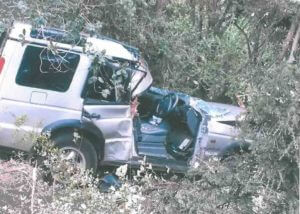
- A young man had crashed into a parked car and been taken to hospital with serious injuries. He was found not guilty of failing to remain and of driving with excess blood alcohol. The excess alcohol charge was dismissed in the Pukekohe District Court because police did not advise the client of his right to consult a lawyer while in hospital. This is a defence that many lawyers would not have attempted because they wrongly think the Bill of Rights does not apply to motorists in a hospital - even the Judge thought that was the case until taken through the issue carefully.
- A beauty therapist had her excess blood alcohol case dismissed in the Ohakune District Court without the client needing to give evidence. The Judge dismissed the case because two nurses had used three needles to make at least six attempts to draw blood.
- A businessman and young politician was found not guilty in the Auckland District Court because the blood sample was taken on a booze bus in circumstances where there was inadequate privacy and a risk to the client's safety.
- A client's appeal was granted by the High Court because the client was forced to defecate in his trousers on a booze bus as a result of police failing to provide a bathroom for some 85 minutes. The High Court said that an "effective and credible system of justice would not countenance the breaches" of the client's rights "nor let them go unanswered and without remedy". In doing so the High Court rebuffed the police submission that an adult should have sufficient self-control to avoid soiling himself, saying "this suggests to me that the [NZ Police] has failed to recognise the enormity of what has occurred here". Click on this news report:
- This farm contractor had his case dismissed in the Thames District Court because police did not prove compliance with the Bill of Rights or that reasonable assistance had been given to contact a lawyer.
- A young and now successful musician was concerned about the impact a conviction would have on travel and his career but was found not guilty after a defended hearing because the nurse had used an out of date medical certificate.
- Client acquitted because the ESR certificate was not signed by an authorised person.
- Another lawyer hired us to defend his excess blood alcohol case. We were successful in having the case permanently stayed in the Auckland District Court on the grounds of undue delay.
- A young client was found not guilty in the Hamilton District Court because the police failed to prove that it was not practicable to do a blood test at one location before requiring the client to accompany the officer to another place.
- This senior international businessman was found not guilty when he had asked to speak to a lawyer and for a blood test at the same time but the officer had not allowed the legal phone call before the blood election.
- A journalist was found not guilty because he had not been allowed to use his own cellphone to call a lawyer and police terminated a legal phone call from a landline before the client had finished obtaining advice.
- This manager had his excess blood alcohol charge withdrawn in the Waitakere District Court as a result of deficiencies in the ESR testing and certificate.
- A courier supervisor had his excess blood alcohol charge dismissed in the Waitakere District Court because police could not prove that the client was the driver of a crashed car, because police arrived at the scene after the client was already in an ambulance.
- Charge dismissed because police cut short the client's 10 minute blood election period.
- This medical student was found not guilty of driving with excess blood alcohol because police had insisted that the client do an evidential breath test over her protest that she wanted to proceed directly to a blood test.
- A builder had his excess blood alcohol charge withdrawn. We applied for disclosure of ESR's new reporting methods and signalled that ESR scientists would be challenged on the correctness of both the testing and reporting methods. Police resisted disclosing this information, opting to withdraw rather than face the prospect of the methods being tested in court by us.
- This IT worker was found by police in an ambulance at the scene of a motor vehicle accident. Police located a drivers licence said to belong to the client in one of the damaged vehicles. The client was taken to hospital, required to do a blood test and subsequently charged with driving with excess blood alcohol. We tested the prosecution case without the client giving evidence. The High Court agreed with our legal argument that the prosecution had not proven that the damaged car was being driven at the time or, if it was, that the client was the person driving it. The client kept his clean record.
- A builder facing disqualification and no ability to get a work licence due a previous conviction was found not guilty in the North Shore District Court. The prosecution case was that police arrived to find the intoxicated client asleep upright in the driver's seat of his car, with his seatbelt on, headlights on, engine running, gearbox in drive, and no brakes or handbrake on. Despite numerous similar cases where courts have inferred an asleep person retained the status of a driver, the client was found not guilty as a result of important distinguishing factors advanced by the defence.
- This IT worker was found not guilty on an excess blood alcohol charge in the Auckland District Court. The Judge found that police had not reasonably complied with their duty to advise the client about his blood election right immediately after the result of the evidential breath test. In those circumstances the Land Transport Act deems the result of the evidential breath test to be inadmissible. The prosecution argued it didn't matter, because the client was charged with excess blood not breath alcohol. After considering very detailed written submissions and over 550 pages of case law we cited the Judge agreed with our submission that it did matter and acquitted the client.
- An IT worker was found not guilty in the Manukau District Court on an excess blood alcohol charge, because police failed to prove that the blood was venous blood or that it was taken in accordance with normal medical procedures.
- This client's excess blood alcohol charge was dismissed after police refused to release the second part of the defendant's blood sample for private analysis, the judge lambasting police for "rich" and unreasonable conduct.
- An off duty police officer followed a client home, breath tested him and then called on duty police to take over. When uniformed police arrived they entered the house to take the client to the police station, at which time the client rang us. Police ignored our warning they were trespassing illegally and proceeded to take the client back to the police station, where he failed a blood test. Police then took legal advice, no doubt about the illegal trespass, and wrote saying no prosecution would be brought.
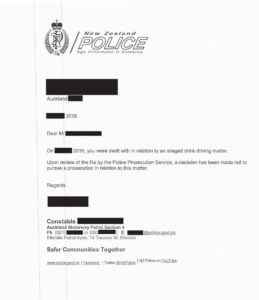
- This real estate agent had his excess blood alcohol charge dismissed after the prosecutor decided to abandon the prosecution after the police officer had been cross-examined by us.
- A media worker was acquitted on an excess blood alcohol charge after police failed to prove a valid blood election had been made. Video footage showed that the police officer had falsified records about electing blood and given the same false evidence in court.
- This client was charged with driving with excess blood alcohol and dangerous driving after admittedly driving off the end of a dead end street and into an estuary. He was found not guilty on both charging documents after we cross-examined the police witnesses. Why? Again we can't give away all our trade secrets to the other lawyers and police that troll our website.
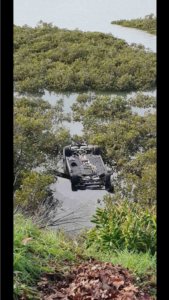
- As a result of crashing into two cars a client faced two charges of drink driving causing injury. Each charge carried a maximum penalty of five years imprisonment. They were the client's 9th and 10th drink driving offences. The blood alcohol level was extremely high, at 292 milligrams. If convicted a sentence of between two and three years in prison was inevitable. We challenged the evidence of the police, doctor and nurse about the taking of the hospital blood sample, including tackling them about inappropriate coaching of witnesses in police emails. At the conclusion of a two day trial the prosecutor agreed that the blood sample was unlawfully obtained. The judge clearly agreed. The charges were amended to the much lesser offence of careless driving causing injury. The client was sentenced to 100 hours community work and reparation.
- Not guilty despite having an extremely high blood alcohol level of 290. Police had unlawfully held the client down so he could be sedated against his will, rendering him unconscious through the taking of a blood test.
- This client was found not guilty at trial on one charge of refusing blood but convicted on a charge of driving while incapable. We appealed to the Court of Appeal successfully, arguing that police had unlawfully detained our client and outrageously broken four bones in doing so. The Court of Appeal overturned the conviction, recommending that the police misconduct issue be sent to authorities for investigation.
- This businessman was referred to us by another defence lawyer after the client had been convicted in the District Court on charges of refusing to supply a blood specimen and refusing to accompany police. We appealed the convictions to the High Court and were successful in having both convictions set aside.
- This property developer was found not guilty of refusing to supply a blood specimen and failing to accompany police because the officer failed to give the client his rights and the officer had given evidence that the roadside breath screening test had produced a failed result from the client breathing on but not blowing in the device. The Judge commented that this dubious evidence "had to be dragged out of the officer" in cross-examination by defence counsel. The Judge then rejected the officer's evidence, saying "I reject [it] as being implausible and unconvincing".
- A real estate agent was acquitted on charges of refusing to accompany police and refusing to do a blood test. Police said they had entered the client's house and arrested him lawfully. The defence case was that police had entered the house illegally, assaulted the client in front of his family and then failed to follow testing procedures. The client was found not guilty on both charges after we cross-examined the officers challenging their version of events. The client was acquitted without even needing to give evidence.
- This businessman was found not guilty of refusing to provide a blood specimen because the client did not intend to refuse, but was trying to exercise his right to consult a lawyer.
- A client on his 7th drink-driving charge had a refusing blood charge withdrawn by police at a defended hearing because of difficulties police had proving that the client had been the driver of the car on a road.
- This builder on his 8th drink-driving charge had a refusing blood charge dismissed as a result of insufficient evidence.
- A businessman was seen swerving all over the road after hitting a curb and blowing two car tyres, while he was alleged to be highly intoxicated. Police also alleged that the client refused to do a breath screening test, was arrested when he tried walking away and that he subsequently refused an evidential breath test and a blood test. The defence case was that police had assaulted the client at the roadside and were lying about the client's behaviour and aspects of the testing procedure. The client was found not guilty in the Manukau District Court after we cross-examined the police officers, exposing numerous inconsistencies and errors in their evidence. The Judge accepted that police had not followed correct procedure and had not proven that the client refused to do a blood test.
- This machinery operator on his 8th drink driving case avoided jail after he was acquitted of refusing a blood test, because police had stopped him unlawfully about an alleged domestic incident.
- This client was found not guilty of refusing a blood test as a result of police entering his garage unlawfully, assaulting him unlawfully by removing a beer from his hand, repeatedly threatening to arrest him unlawfully, and then taking him unlawfully to the police station for testing against his rightful protest.
- This consultant was acquitted on a 2nd charge of refusing to supply a blood sample. The police gave evidence about refusal whereas the client gave evidence that he was not refusing. After we cross-examined the police officer on failures to follow correct procedures the judge was not satisfied that the prosecution had proven the client refused a blood test.
- This client facing imprisonment on an 8th drink driving charge was acquitted of refusing a blood test.
- Another client facing imprisonment on a 7th drink driving charge was found not guilty of refusing a blood test after we challenged the police detention of the client and the evidence about the refusal.
- Not guilty of refusing a blood test after police had unlawfully manhandled yet another motorist, by using a pain-compliance method to remove an elderly man from a toilet cubicle while his trousers were still around his ankles.
- This top international sportsman was found not guilty of driving under the influence of drugs to such an extent as to be incapable of proper control, because the client had passed 2 out of the 3 parts of the compulsory impairment test.
- This client was charged with driving under the influence of a drug to such an extent as to be incapable. The police case was that they found the client hanging out the driver's window in a comatosed state with vomit down the door. They attributed admissions to the client that he had consumed several illegal drugs beforehand. Several weakness in the prosecution case were exposed after we cross-examined the police officer. The prosecutor offered the client diversion, with the case ultimately being withdrawn.
- A bank mortgage manager was found not guilty of driving while impaired and with blood containing a prohibited drug because the officer's compulsory impairment qualifications were not valid.
- Our client was on the wrong side of the road and collided head on with another car, which sadly burnt with the driver trapped in the car. Charges of aggravated careless driving causing death and injury were laid. The case proceeded to a defended trial, at which our cross-examination of two police crash experts showed significant deficiencies in the police investigation. While the judge found that it was possible that our client had fallen asleep the judge nonetheless found that carelessness was not proven due to the deficiencies exposed - see this NZ Herald article:.
- This taxi driver was charged with dangerous driving causing injury, drink driving causing injury and failing to stop to ascertain injury. It was a serious crash with serious injuries. Each offence has a maximum penalty of 5 years imprisonment. The prosecution case was that the defendant drank half a bottle of whiskey, drove at high speed over 2 traffic islands, took out 2 road signs, smashed a curb, broke a power pole in half, uprooted and snapped a tree in half, and then smashed through a block wall. The prosecution produced photos of this damage and had a crash scene expert give evidence. The defence cross-examination of the police witnesses established significant doubt about the police theory of the accident. By the end of the day the defendant was found not guilty on all charges, without needing to give evidence.
- This client had failed to stop on the motorway, colliding heavily with several cars in front. One of the drivers regrettably suffered serious injuries. Notwithstanding the failure to stop the judge agreed with our submission that the client had not driven carelessly causing injury.
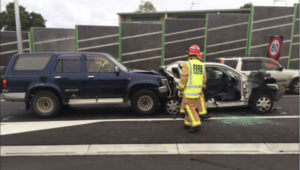
- In another case the police evidence alleged that a client had driven at 130km/h in a 50km/h area while almost twice the legal alcohol limit, overshot an intersection, crashed into a parked car and then did a runner. He was charged with failing to stop and ascertain injury, careless driving and drink driving. The defence case included that police gathered evidence illegally by trespassing and had also broken other rules. All charges were dismissed.
- A client was found not guilty in the Warkworth District Court on charges of failing to stop and for dangerous driving when police could not identify him as the rider of a motorbike, despite police having a video of the chase.
- This 17 year old client was found not guilty in the Pukekohe District Court on a charge of careless driving causing injury after the client had rolled his car down a bank, because the police could not disprove that large rocks near the accident site had caused the crash.
- In a road rage incident the client was alleged to have chased another car and then deliberately rammed it on the motorway. The client was charged with dangerous driving. Despite police having four witnesses to the incident and photos of the damage we negotiated the lesser charge of careless driving and no disqualification for the client.
- A student was found not guilty of careless driving after he had done a u-turn in front of another car because police could not prove the client was at fault as opposed to the other driver speeding.
- This businessman was acquitted in the Auckland District Court on a charge of careless driving causing injury. The police said that the client failed to stop at a stop sign and collided with an oncoming car. After we cross-examined the driver of the other car and an independent witness the Judge agreed that the police had not proven the accident was the client's fault.
- A motorcyclist gave intemperate evidence blaming our client for an accident that regrettably resulted in significant injury. The defence theory was one of a mid-life crisis gone bad, whereby the middle-aged rider on a new superbike was showing off to friends by illegally accelerating to a high speed when approaching an intersection, only to panic, lock his brakes and ditch his big boy toy in a rookie way. Case dismissed!
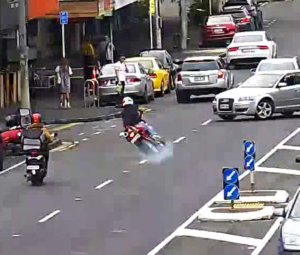
- A client's charge of careless driving causing serious injury to a motorcyclist was dismissed because the police had delayed charging the client for almost 6 months, resulting in prejudice to a legitimate defence that the motorcyclist was at fault.
- This farmer had a dangerous driving charge reduced to speeding at a defended hearing because police were unable to prove that greatly excessive speed was dangerous. The client avoided a criminal conviction and saved his licence.
- Discharged on a dangerous driving charge in the Huntly District Court as a result of late police disclosure.
- CCTV footage from the Auckland Motorway showed a car swerving across motorway lanes, cutting off cars, almost hitting barriers and traveling at erratic speeds. This client was found not guilty of dangerous driving despite police having this footage, plus an independent witness and the officer who stopped the client. How? It's a secret.
- A client was found not guilty in the North Shore District Court on a charge of careless driving causing injury. The police case was that the client had driven carelessly by failing to stop at a pedestrian crossing, hitting and injuring an 11 year old boy. The accident was recorded on CCTV. The client was very upset about the fact the boy was injured, and thankfully he recovered fully from his injuries. However, the client also maintained that he had not driven carelessly. We argued successfully that while the boy had been hit on a crossing the client could not have been reasonably expected to stop in time. The case was dismissed.
- Reckless driving acquittal in the Queenstown District Court. The police alleged our client had been driving at 176km/h and then rolled down a steep bank, resulting in significant damage and injury. Our view was that the police had searched the car illegally, had no more than speculative forensic evidence to support their allegation, and that the police serious crash investigator wildly overstated his evidence. Case dismissed!
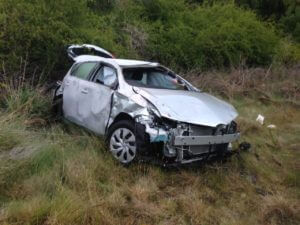
- Two cars changing lanes on the Auckland motorway at about the same time took evasive action to avoid each other, with our client losing control and spinning into the path of a motorbike. The motorcyclist was seriously injured, with six broken vertebrae and other injuries. The police accused our client of causing the injuries by not looking as she changed lanes and by not seeing the other car and taking evasive action sooner. We argued that the prosecutor was unfairly breaking the CCTV footage of the crash down into nanoseconds rather than real time and we used international case law to support the submission that our client's driving and split second response was not careless. The client was acquitted. Thankfully the very gracious motorcyclist had recovered fully from his injuries.
- Police alleged that our client had ridden his motorbike dangerously by riding at high speed while overtaking some 20 cars, sandwiching himself between opposing traffic and almost causing a car to crash off the road as he overtook on the wrong side of the road on a blind corner. The chasing officer gave evidence that he saw these overtakes and was travelling at 170 km/h but our client "left him for dead". Our cross-examination of the officer showed he had exaggerated parts of his evidence and we raised a number of deficiencies with his evidence, such that the judge could not be sure and the charge was dismissed. This was a senior officer and instructor with 27 years experience on traffic duties. We admitted speed of 142 km/h captured on police radar, but challenged the higher speeds and the manner of overtaking. No conviction. Not even a speeding ticket!
- Police radar captured this client doing 165km/h on a motorway onramp. The police officer was an instructor on radar and driver training for police. He alleged our client was driving dangerously. The judge disagreed after we exposed flaws in the officer's assessment. The judge accepted the speed was 165km/h however, agreed with our legal argument that the speed was not dangerous. Case dismissed. Not even a speeding ticket!
- Successful appeal in the High Court overturning a conviction for careless driving causing injury to a cyclist who was illegally undertaking the client.
- A scooter rider claimed our client had stopped in the middle of the road and then turned abruptly right without warning as the scooter attempted to overtake the stopped car. Our cross-examination of the scooter rider showed her evidence to be false. Case dismissed.
- Kaikohe police alleged our client had pulled out in front of a motorcyclist causing a fatal collision. The prosecutor decided to withdraw the charge after our assessment showed serious flaws in the assessment of the police serious crash unit.
- A client was self represented on parking tickets in the Tauranga District Court and lost, with the Community Magistrate inappropriately saying "you have just wasted the whole afternoon...you are just trying to weasel your way out of these five infringements". We were subsequently hired and took a different point on appeal, with the appeal Judge agreeing that the Bylaw was unlawful and invalid so the tickets should never have been issued. The only waste was the Council spending tens of thousands of taxpayers' dollars on an unlawful bylaw!
- This saleswoman was found not guilty in the North Shore District Court on a charge of driving while suspended because the police did not prove that the person who signed the suspension notice was authorised to do so.
- Driving while disqualified not proven because the client had miscalculated the disqualification period and the police could not prove the client knew he was disqualified when stopped.
- A client was found not guilty of failing to stop and for dangerous driving when police could not identify him as the rider of a motorbike, despite police having a video of the chase.
- Another two clients were found not guilty of failing to stop relating to the same chase when at a different defended hearing the police could not prove that the clients had seen police in the bike mirrors.
- Not guilty of failing to stop for police because the officer signalled the client to stop because the car looked suspicious rather than for land transport purposes.
- Successful defence of a speeding ticket because police could not prove identity of the driver, saving the client excess demerit points and suspension.
- A failing to provide details charge was withdrawn in the North Shore District Court after the police officer had been cross-examined by us. The officer gave evidence under oath that was at serious odds with video footage of the arrest.
- This company director was acquitted of failing to provide particulars of the driver of a car used to do burn outs, because the owner of the car was the client's company rather than the client personally.
- This accountant was found not guilty in the Huntly District Court on a speeding charge because police could not prove that temporary speed signs were lawfully installed at roadworks.
- Another defence lawyer engaged us to defend his speeding charge. The lawyer was found not guilty of speeding because the officer did not identify him in evidence as the driver of the car - even though the Judge knew the lawyer, and he was appearing in a different case in the courtroom next door!
- Charges of resisting arrest, assault police and drink driving withdrawn at a client's defended hearing as a result of defence challenges to the lawfulness of police being on the client's property and a procedural error when processing.
- A businessman was facing loss of licence or suspension for excess demerit points if convicted on a speeding charge. Police withdrew the charge rather than disclose information requested by us about the accuracy and operation of the police laser.
- This digger operator was acquitted in the North Shore District Court on a sustained loss of traction charge.
- Speed camera captured a supercar doing 135km/h in an 80km/h area. More to this story than meets the eye, but suffice to say we won't take a backward step. The judge dismissed the speeding infringement.
- A client living overseas instructed us to apply to set aside a 5 year old conviction for careless driving causing injury and to apply for a discharge without conviction. The client had trained and qualified as a commercial pilot but could not obtain a job because his conviction prevented him traveling internationally under the Convention on International Civil Aviation (known as the Chicago Convention) and airlines had a "no conviction" policy. After we drafted and filed written submissions the police supported the application and a discharge without conviction was duly granted in the Palmerston North District Court without any further legal argument.
- A businessman was granted a discharge without conviction on a drink-drive charge because of the combined effect that a conviction would have on his employment and international travel.
- A nurse was granted a discharge without conviction on a careless driving causing injury charge as a result of the consequences a conviction would have on her study and career.
- This professional chef was discharged without conviction on a charge of driving with an excess breath alcohol level of 653 because of the impact a conviction was likely to have on her NZ residency application.
- A doctor was discharged without conviction as a result of immigration and employment issues after being charged with careless driving causing injury to a motorcyclist, namely a broken back and leg.
- An early childcare worker was discharged without conviction on an excess blood alcohol charge as a result of the likely impact a conviction would have on his role.
- This accountant was discharged without conviction in the Auckland District Court on a charge of careless driving causing injury, after crashing his car causing a head injury to his passenger.
- A salesperson came to us after being declined a discharge without conviction on a drink driving charge. We appealed successfully, despite police producing evidence of the client driving dangerously and with excess blood alcohol. The client kept is clean record.
- A furniture maker was discharged without conviction on a drink driving case, despite police opposition and submissions that it was serious offending and "could have resulted in death or injury to members of the public".
- This student was discharged without conviction in the Auckland District Court on an excess breath alcohol charge because of the impact a conviction would have on her future.
- A client was discharged without conviction in the North Shore District Court on a drink driving charge due to deportation liability.
- This hairdresser was granted a discharge without conviction on a careless driving causing injury charge in the Papakura District Court in light of collective personal circumstances.
- We successfully appealed the refusal to grant a student a discharge without conviction on a drink driving charge, arguing that driving to avoid a safety threat significantly mitigated the gravity of the offending and justified a discharge on the facts of this case.
- This senior military officer was discharged without conviction on a drink driving charge as a result of the risk a conviction would have to his career and service to his country.
- This police officer was granted a discharge without conviction on an excess blood alcohol charge, despite strong opposition from the New Zealand Police. It's right to not treat your own favourably, but to treat them more harshly for the sake of appearances is just unfair.
- This law student was discharged without conviction on an drink driving charge, because of the impact a conviction would have on her future plans.
- Discharge without conviction granted to a foreign national on an excess breath alcohol charge after it was accepted the police witness had given false evidence under oath.
- Client discharged without conviction on a drink driving charge to enable her to travel overseas.
- Discharge without conviction granted on drink driving and careless driving involving a crash on the motorway, because of deportation liability for a visa holder.
- A client who had accidentally driven off the fifth floor of a car park building was not disqualified, the judge agreeing that s 81 special reasons applied because the car park barrier was deficient. Experts stated that the barrier “had little structural integrity, and was not strong enough to prevent a vehicle driving through it” and that “the current state of this carpark is another accident waiting to happen”. Unbelievably, neither the New Zealand Police nor WorkSafe investigated in respect of the building owner's liability under various health and safety laws.
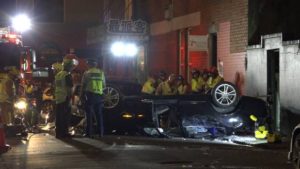
- Community work instead of disqualification granted to the client on a 2nd drink-drive charge under s 94 of the Land Transport Act because of the hardship he would suffer during the 28 day stand down period that applies before a limited/work licence can be applied for.
- Alcohol interlock order and intensive supervision sentence instead of disqualification exceeding one year and a more restrictive sentence, despite the client being on his 7th drink-drive charge and having been sentenced to imprisonment before.
- Community work instead of disqualification granted to a client on a 3rd drink-drive charge because of the impact disqualification would have on his business and staff.
- Community work instead of disqualification granted to another client on a 3rd drink-drive charge because of lack of alternative transport from a remote area.
- No disqualification on a charge of careless driving causing injury. The client was the driver of a 45 tonne truck that hit a 12 year old girl on a pedestrian crossing, regrettably resulting in serious injuries. After filing written submissions the judge agreed that there were special reasons to not disqualify the client, under s 81 of the Land Transport Act.
- No disqualification for a self-employed contractor on a 2nd drink driving charge, sentenced to the minimum 40 hours community work instead and no further penalty.
- Disqualification reduced under s 81 for a young client on an excess breath alcohol charge. The client had been riding a motorbike without a helmet on a grass verge, with a box of beer under one arm.
- Limited licence granted to this Auckland mother, allowing her to drive her children not only to school but to sports and activities 6 days a week. The client was also authorised to drive to coach a sports team. Police opposed the licence saying that driving for such purposes was not part of the limited licence scheme however, the Judge agreed with our submission that it was appropriate.
- The mandatory minimum six month disqualification period for drink driving was reduced to two months under s 81 of the Land Transport Act because the client had driven to escape from a man that was intimidating her.
- A business owner was granted a s 94 application that he do community work instead of disqualification, in order to allow him to continue operating his sign writing business.
- Client granted a s 94 community work order in lieu of disqualification on the basis that he had used a personal breathalyser on the night and needed a licence for work purposes.
- This heavy machinery operator faced being sent back to prison on his 7th drink driving charge. He had been to prison on several earlier occasions. After we made submissions to the Judge the client was sentenced to intensive supervision and an alcohol interlock order to allow him to continue in his employment.
- A security guard was charged with endangering transport, an offence with a maximum penalty of 14 years imprisonment. The client had thrown a bottle through a window hitting the driver of another car in the face while driving on the motorway. After negotiations with police the charge was reduced to common assault, carrying a maximum penalty of 6 months imprisonment. In light of the client having relevant previous convictions he was sentenced to 60 hours community work and supervision.
- This quantity surveyor pleaded guilty on his 3rd drink driving charge and to driving while disqualified. He had been disqualified 2 days earlier for drink driving and had been caught again with a breath alcohol level of 953 after crashing his car. After we made submissions to the Judge the client was convicted and discharged, meaning he received a record for the convictions but there was no further penalty other than the mandatory disqualification.
- A builder on his 10th drink drive charge was sentenced to community detention, community work and supervision, along with an alcohol interlock order to allow him to continue driving for work after three months.
- A manager who pleaded guilty to a 5th drink driving charge in close proximity, and had other relevant convictions, was sentenced to 2 months community detention, community work and supervision.
- Another client pleaded guilty on his 3rd drink driving charge after he had crashed into a parked car and subsequently returned an extremely high blood alcohol result of 406 (or a breath equivalent of 2030). The client received a rehabilitative sentence.
- A businessman who had been imprisoned previously entered a guilty plea to a 4th drink driving charge and was sentenced to community work and supervision.
- A builder pleaded guilty on his 4th drink driving charge, all being very high levels (blood alcohol levels of 220, 230, 256 and 305 (or breath equivalents of 1100, 1150, 1280 and 1525)). After we made submissions to the Judge the client was sentenced to pay a $1,500.00 fine and disqualified.
- A computer programmer pleaded guilty on his 4th drink driving charge. He was sentenced to community work and disqualification, only, despite having a breath alcohol level of 889 and having been seen swerving all over the road and almost crashing into another car.
- A client was sentenced to community detention and supervision on charges of drink driving causing injury, failing to stop for police and dangerous driving, despite it being his 3rd drink driving case and the injury charge having a maximum penalty of 5 years imprisonment.
- This drain layer was sentenced to community detention and supervision on his 8th drink driving charge, involving a high level and accident, despite having been sent to prison on four of his previous drink driving cases.
- This client was sentenced to a non-custodial sentence focused on rehabilitation after entering a guilty plea on a careless driving causing death charge.
- Another client was at jeopardy of a dangerous driving causing death charge however, following negotiations the client was charged with careless driving and granted diversion.
These are some testimonials and client comments selected by us:
- "You are the best in the business. How do I know this? I use to work for Police Prosecutions" (A 2021).
- "Hi Alistair, just a quick thank you for the way you handled my case yesterday. Total professionalism from start to finish" (DB 2020, not guilty on excess blood alcohol).
- "Just want to say that I’m so grateful that you’ve done an unbelievable job on my case! I can’t express my appreciation enough upon your professional hard work." (IY 2020, not guilty of drink driving).
- "Thank you bud, absolutely...you were awesome" (Dr C 2020, discharged without conviction on drink driving).
- "Extremely happy. Very thankful with outcome. Really appreciate the work Alistair, thank you so much" (CD 2019, acquittal on hospital blood alcohol charge and dangerous driving).
- "Once again thank you Alistair, Yay I picked the best person to represent me!! (A 2019, acquittal on drink driving)
- "Thank you Alistair for your outstanding representation. I am extremely satisfied with the effort you put into my defence and the eventual dismissal of the charges. I was initially worried about the consequences of the drink driving charges I was facing but after my very first meeting with you my mind was put at ease. Your explanation of the law and the arguments for defence were communicated in a professional but very easy to understand manner. We went into court armed with a solid defence and your ability to immediately recognise errors made by the prosecution securing the successful outcome." (GC 2019)
- "Feet haven't touched the ground just yet, thanks again Alistair I really appreciate your work and support" (GJ 2019)
- "Thanks again...I'm glad I found you as it seems you are the best traffic lawyer by far" (KM 2018)
- "My highest gratitude and appreciation. I am so grateful for everything you did for me" (JH 2018)
- "I would just like to thank you and commend you for your hard work on my behalf. I don't need to tell you, but this has been hugely stressful and I am glad to see the back of it with the best possible result." (J 2018 discharge without conviction on drink driving)
- "Thanks again for all your great work in helping us beat these evil swines at..." (M 2017)
- "Thank you Alistair, you were amazing" (JC 2017, acquittal on drink driving)
- "Thank you so much for everything you have done for me. You are truly great. Much much appreciated and hope to learn from this lesson." (SK 2017)
- "I would like to say thank you again for your hard work and thorough oral submission yesterday in court. Great job. I am glad I pursued the discharge without conviction..." (J 2017, discharge granted on excess breath alcohol)
- "Hi Alistair, we thank you so so much for your hard work in getting a brilliant result!! Really glad to have met you, despite the circumstances." (DT 2017, acquittal on drink driving)
- "Good work, well done buddy" (BW 2017, acquittal on reckless driving)
- "I just want to thank you again for your tenacity, positivity, compassion and undoubtedly your skill in the careful crafting of your submission. There is no doubt in my mind that you maximised the chances of this dismissal by inexorably leading the judge to this favourable outcome." (CS 2016)
- "I found Alistair...very good, understanding, their knowledge, ability and experience were second to none. The fees charged I felt were more than reasonable for the time and effort put in. The results we gained were brilliant. No fines, convictions or lost license. I could not have asked for a better result." (PS 2016)
- "Morning Alistair. Just wanted to say a big thanks for your help and time....it was a good day yesterday" [acquitted on an excess blood alcohol charge] (SW 2016)
- "Alistair Haskett was the right man for the job from the get go. He has immense knowledge in his specialised area which gave me massive confidence in using his advice. He is a fighter and makes sure that he gives 100% to the job at hand. My result was more than satisfactory. I can highly recommend Alistair's service to anyone who needs them." (SR 2015)
- "A perfect result, justice was served. I got off a drink driving charge for the right reasons, you were great to work with, spoke in words I could understand and the best part, you got me off with no charge. Thank you Alistair, would recommend you to anyone." (SW 2015)
- "Hi Alistair.... thanks for the decision document. Full credit goes to you. Thanks be to God." (TG 2015)
- "Thanks for this and the brilliant result in court." (AB 2015)
- "E te Rangatira.... Tena koe .... Arguably the best defence lawyer ever.....you are a true professional. THANK YOU, THANK YOU, THANK YOU." (RB 2014)
- "Thanks Alistair...Big sigh of relief...I can’t thank you enough for your work on this...let me know if I can shout you lunch down the viaduct to say thanks." (SD 2014)
- "Now I truly understand the phrase: 'waves or relief...' ... Thank you so much for all your work and expertise!" (DF 2014)
- "Thanks heaps mate a big weights been lifted off my shoulder!" (JJ 2014)
- "An absolutely fantastic result...thanks heaps!!" (DA 2014)
- "We are having a relaxing worry free holiday....Thank you for your help and your integrity with my 1st and hopefully last brush with the law. 'CASE DISMISSED'" (GB 2014)
- "You did such a fantastic job for me in my last case. Having found a way to have my charge dropped, my license kept and my criminal record clear from charge. The way you tackled it was above and beyond what I expected. The prosecution seemed stumped with the angle you came from and I’m fairly confident you discovered something that other lawyers have not noticed before. I would absolutely love to have you represent me in the upcoming case I have for DUI (Excess Blood Alcohol)" (HD 2014)
- "I appreciate everything you have done, your a fighter and the world needs more people like you." (SH 2013)
- "I just wanted to thank you for everything you've done for me, I'm still blown away by the outcome." (MB 2013)
- "Alistair Haskett has represented me on two occasions for drink driving and associated charges. He successfully defended both cases without my having to give evidence. I found Alistair to be professional while still being approachable and 'human'. He knows the law inside out and left no stone unturned to get the result required. He explained the court process to me thoroughly and in 'normal' language so there were no surprises. He will stick up for your rights even when you feel bullied or intimidated by the police, it certainly doesn't faze him. He is an extremely talented barrister and I would highly recommend his services. Thanks Alistair, for a great job done!" (ST 2012)

